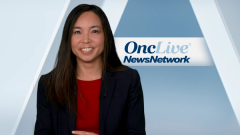
First-Line Treatment Options for AML
Catherine E. Lai, MD, MPH, discusses the current standard of care in the first-line treatment of patients with AML and which factors guide therapy selection.
Episodes in this series

This is a synopsis of an Insights series featuring Catherine E. Lai, MD, MPH, of the University of Pennsylvania.
Dr. Catherine E. Lai discussed advances in standard of care for AML treatment over the past 5 years. Historically, treatment was based on age cutoffs, with intensive chemotherapy like the 7+3 regimen (cytarabine and daunorubicin) for younger patients and hypomethylating agents like azacitidine for older patients. However, Dr. Lai emphasized considering physiologic rather than just chronologic age given improving health of older patients.
For fit patients, standard induction chemotherapy is the 7+3 regimen. For unfit patients, azacitidine plus venetoclax is standard. If the patient has a targetable mutation, molecularly targeted agents can be added. For FLT3-mutated patients fit for intensive chemotherapy, midostaurin or quizartinib can be added to 7+3. Midostaurin is approved for both FLT3-ITD and FLT3-TKD mutations, while quizartinib is limited to FLT3-ITD. For favorable risk core binding factor leukemias, gemtuzumab ozogamicin is added to 7+3, improving overall survival.
For IDH1/2-mutated patients fit for intensive chemotherapy, 7+3 remains standard, though studies are evaluating adding IDH inhibitors. For unfit IDH1-mutated patients, ivosidenib can be added to azacitidine. Azacitidine and venetoclax is also FDA-approved, with venetoclax showing particular sensitivity in IDH-mutated patients.
Dr. Lai concluded that thanks to improved understanding of AML biology and molecular subtypes, treatment options continue to expand with the addition of molecularly targeted agents to standard backbones. Comprehensive testing at diagnosis informs treatment selection based on mutation status and fitness considerations.
*Video synopsis is AI-generated and reviewed by OncLive editorial staff.







































